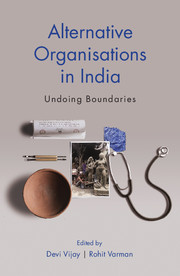Book contents
- Frontmatter
- Dedication
- Contents
- List of Tables and Figures
- Acknowledgements
- Chapter 1 Introduction: Undoing Boundaries
- Chapter 2 Formal and Informal Technologies of Alternative Organisational Spaces within the State: An Analysis of Violence, Wrongdoing and Policing
- Chapter 3 Scripting Alternative Images: Institutions, Practices and Scripts of the Mritshilpis of Kumortuli
- Chapter 4 Shelter for Homeless: Ethnography of Invisibility and Self-exclusion
- Chapter 5 Alternative Spaces of Employment Generation in India: Informal Rules, Structures, and Conflicting Organisational Requirements
- Chapter 6 Shaheed Hospital: Alternative Organisation, Ideology and Social Movement
- Chapter 7 Acting for Change: A Circuits of Power Analysis of a Denotified Nomadic Tribe and Budhan Theater's Struggle for Change
- Chapter 8 Swaraj: An Alternative University
- Chapter 9 Alternative Organisations: Spaces for Contestation
- Contributors
- Index
Chapter 6 - Shaheed Hospital: Alternative Organisation, Ideology and Social Movement
Published online by Cambridge University Press: 05 April 2018
- Frontmatter
- Dedication
- Contents
- List of Tables and Figures
- Acknowledgements
- Chapter 1 Introduction: Undoing Boundaries
- Chapter 2 Formal and Informal Technologies of Alternative Organisational Spaces within the State: An Analysis of Violence, Wrongdoing and Policing
- Chapter 3 Scripting Alternative Images: Institutions, Practices and Scripts of the Mritshilpis of Kumortuli
- Chapter 4 Shelter for Homeless: Ethnography of Invisibility and Self-exclusion
- Chapter 5 Alternative Spaces of Employment Generation in India: Informal Rules, Structures, and Conflicting Organisational Requirements
- Chapter 6 Shaheed Hospital: Alternative Organisation, Ideology and Social Movement
- Chapter 7 Acting for Change: A Circuits of Power Analysis of a Denotified Nomadic Tribe and Budhan Theater's Struggle for Change
- Chapter 8 Swaraj: An Alternative University
- Chapter 9 Alternative Organisations: Spaces for Contestation
- Contributors
- Index
Summary
Ideology is an essential feature of any society, and stable social systems draw upon it to cultivate beliefs in their legitimacy and to suppress contradictory beliefs (Eagleton, 1991; Habermas, 1976). However, marketing theory has paid limited attention to the role of ideology in the functioning of markets (exceptions include Kozinets and Handelman, 2004; Thompson and Arsel, 2004). This oversight is surprising because market-based exchanges and consumption as essential features of capitalism build on supporting ideologies for their acceptance (O'Reilly, 2006; Sklair, 1994). Similarly, oppositional social movements within capitalism use counter-ideologies to countervail and oppose the dominant system (Beuchler, 2000; Touraine, 1981). Marketing theory has under-examined the role of social movements in shaping alternative institutions that challenge market-based offerings. We offer a corrective to these lacunae by presenting insights into a healthcare initiative that is shaped by a workers’ movement impelled by Marxist- Leninist ideology.
In this chapter, we examine Shaheed Hospital at Dalli Rajhara in the central Indian state of Chattisgarh. Shaheed Hospital (SH) was set up in 1983 and offers low-cost healthcare to subaltern consumers living in the region. This chapter helps understand how a counter-ideology and social movement are necessary for the creation of alternatives to market-based offerings. SH further helps us refine our understanding of how a counter-ideology is used to challenge prevailing marketbased norms and to denaturalise existing social relations. A health facility also materialised the counter-ideology of Marxism-Leninism and created a broader participation that was necessary for the movement in its early years. Paradoxically, SH also reflects the limitations of an isolated alternative institution, whose survival became dependent on a few heroic individuals as the social movement and ideology that created it declined.
In the following section, we examine the theoretical ideas of ideology and social movement. We follow this review with the presentation of the findings on SH. We conclude the chapter with a discussion of the theoretical ramifications of our study.
Ideology and social movements
Ideology
Drawing from Eagleton (1991) we describe ideology as ideas, which can be false and deceptive, that arise out of the material structure of society.
In this interpretation of the term, we do not attribute ideology to any one particular group or a class of actors. Instead, we interpret ideology as the systemic necessity of a particular socio-economic order.
- Type
- Chapter
- Information
- Alternative Organisations in IndiaUndoing Boundaries, pp. 152 - 182Publisher: Cambridge University PressPrint publication year: 2017



